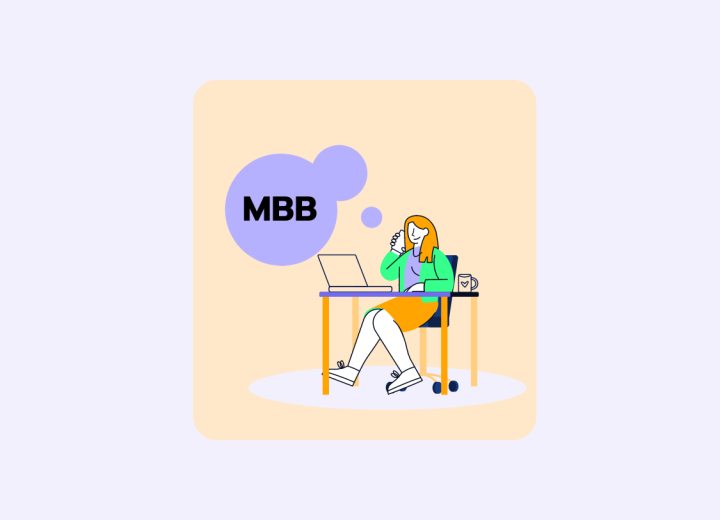Networking should be seen as a key part of your consulting recruitment process. You do not want to overlook this! Francesco, the author of this article, gives reasons why you should never neglect the networking part of the recruiting process, information about referrals when to start with the networking process and how to actually network to get a referral.
Networking As Part of the Management Consulting Preparation Process
Getting That Interview
Management consulting is one of the most competitive industries to break into, given the high pay, prestige, and career prospects that it offers. This is especially the case with the MBB firms (McKinsey, BCG, and Bain), which receive hundreds of thousands of applications annually. Traditionally, only about 1% of these applicants end up with an offer.
However, contrary to popular belief, the bulk of these applicants are not filtered out at the interviews. In fact, it is estimated that less than a quarter (25%) of applicants even make it to the interview stage. Therefore, while candidates have reason to dread the infamous case interview, the most difficult hurdle they have to overcome during the recruitment process is passing the profile screening.
As the number of people applying for consulting continues to grow at a rapid rate, recruiters are overwhelmed with applications and struggle to decide which candidates to progress to the next stage. Even if you are from a target school and have a kick-ass profile, it is no guarantee that you will make it through. If you are not from a target school, or your profile does not match the traditional consulting background, then you are even more out of luck: chances are, the recruiter will not even read through your meticulously-crafted application documents and they will be stuck in the application purgatory forever.
Thankfully, there is one thing that would help ensure the hours you spent on your resume and cover letter are not wasted: referrals!
What Are Referrals?
A referral occurs when someone connected to your target firm vouches for you and highlights to the firm that they should take a closer look at your application. In other words, they will ‘pound the table for you and increase the chances that you are noticed by the application screener and, by extension, be selected for the screening test or interviews.
Most consulting firms have formal referral systems where existing employees can upload the resumes of people they are referring to and write a couple of sentences about why they think they are suitable candidates. However, some consultants – especially more senior ones – may just forward your resume to the recruiter and ask them to take it from there.
If your referrer carries enough weight, you might even be able to skip some screening steps! You cannot skip the interviews though.
If you successfully make it through the interviews and end up with a job offer, then your referrer may get a referral bonus.
Who To Approach for Referrals?
Like many things in life, not all referrals are equal. Good rules of thumb to follow include:
- The more senior your referrer, the more weight his or her referral carries. For example, a referral from an Associate might get your application noticed, but a referral from a Senior Partner would almost guarantee that you progress to the next stage (assuming your profile meets the bar set by the firm).
- The deeper your relationship with your referrer, the stronger their referral will be. When they know you better, they will be able to build a stronger case for why you would make a great candidate.
- A referral from within your target office will be stronger than one from outside it. This is because a local referrer would be more connected to the key stakeholders and thus have a stronger influence on your candidacy.
- A referral from a current employee is worth more than one coming from a former employee. It does not happen often, but ex-employees may sometimes offer to refer you to their former colleagues in the firm. As expected, such a referral would naturally be weaker.
When To Start Networking?
You should start networking early on in your recruitment process, ideally at least 1 month before sending your formal application. This is because networking is less of a sprint and more of a marathon with a referral at the finish line. While consultants have a financial incentive to refer candidates, when they do so, they are putting their reputation within the firm on the line. Hence, they need to be confident in your abilities before they offer or agree to refer you. Accordingly, you should start building a relationship early on to foster this confidence.
Additionally, networking should never be your sole focus during this period. You should have a finalized resume ready by the time you expect a referral. Moreover, you should also start your case preparation as some consultants might offer to give you a mock interview before agreeing to refer you. This is a way to assess whether you would make a strong candidate before they formally vouch for you.
How To Network for Referrals?
There are many avenues an aspiring consultant can pursue to secure a referral:
Personal Network
As expected, the best way to get a referral is by leveraging your personal network. If you already have a relationship with a consultant in your target firm, then the hard part is done. Depending on the strength of your relationship, you could simply just reach out to them about your intent to apply, and they would be happy to refer you.
If you do not personally know anyone, then you can leverage the network of your colleagues, friends, and family. This would still be better than cold contacting these consultants. However, since these would be second-degree connections, do expect to put a bit more work into building up that relationship.
Schools Events
If you are from a target school, then you are in luck. Your consulting club and career service will probably organize multiple networking events throughout the year, particularly during recruitment season.
These events could be anything from company presentations to dinners and coffee chats. These sessions are usually more about getting you interested in the firm, but the consultants present are also keeping their eyes on potential recruits. In fact, recruiters may ask the consultants to present their observations of the attendees after the event. So, take this opportunity to ask insightful questions (for which you cannot find the answer elsewhere) and network with the consultants there. Finally, be sure to get their name cards and follow-up afterward.
Firm Recruitment Events
If you are not from a target school or have already graduated, you don’t have to worry. Some firms regularly organize informational sessions that are open to the public. These kinds of sessions are increasingly common as the top firms realize that good talent not only resides in their target schools. Such sessions are usually similar to the ones in target schools. However, these sessions usually involve a stronger filtering process (usually a resume screen), so be prepared!
Cold Contacts
If you do not know any consultants in your target firms personally and recruitment events are not an option for you, then your only option is to cold contact consultants. The best way to find these potential referrers is via LinkedIn. You can use the filtering system on LinkedIn to filter for consultants from your target office, and, if possible, for alumni from your alma mater or previous companies, as these are the ones who would most likely refer you.
When contacting these individuals, take note that your objective is to set up a short call (of around 10-15 minutes) with them to learn about their experiences, and not to ask for a referral. After all, you are a stranger to them; they have no reason to refer you just because you asked nicely on LinkedIn.
Most of your outreach messages/emails will be ignored, but hopefully, a handful will convert into calls. Once you get into a call with a consultant, you now have to build a relationship with him or her based on common interests. Do not spend half the call pitching yourself (unless they ask, of course). Instead, ask questions about their experience choosing the firm or about the projects they have worked on in a domain that interests you, and then take it from there.
If you come off as genuine and client-ready, they may offer to refer you on the spot. If you feel that there was a strong connection but they did not offer to refer you, then you could ask for one indirectly. Alternatively, they may sometimes offer to mentor you, give you a mock interview, or even offer to schedule a second call or meet-up to answer any other questions you may have. Each situation is different, so you will have to play by ear and do whatever seems best.
Regardless of which avenues you pursue, remember that nothing in life is guaranteed. You might not end up with a referral at the end of the day, but if you managed to get on a call with a current or former consultant, then you should at least have gained enough content to tailor your cover letter to your target firm and make it stand out. That, while not a referral, could still help your chances of making it to the next stage.
Holistic Preparation
Overall, networking is a key part of the consulting recruitment process that should never be overlooked. That being said, if you want to walk away with your dream MBB offer, you will need to be prepared in all aspects, from writing stellar application documents and reading up on test strategies to preparing fit stories and practicing case interviews. Thus, make sure your preparation is holistic and you do not omit any of these important areas.
About the Author
Continue to Learn




